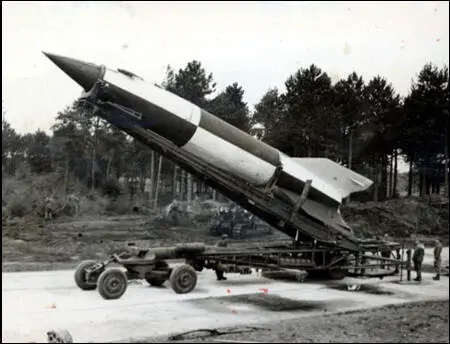On this day on 8th September
On this day in 1881 Ethel Annakin is born at Pannal, near Harrogate, the daughter of Richard Annakin, a nonconformist building contractor, and his wife, Hannah Hymas.
Ethel went to Edge Hill College in Liverpool, to train as a teacher, where a radical preacher, Rev. C. F. Aked, converted her to Christian Socialism. In 1903 she moved to Leeds to take up a post as a schoolteacher and became a member of the Independent Labour Party (ILP) she was also active in the Temperance Society. At the ILP she met Mary Gawthorpe and Isabella Ford, and the three women formed a local branch of the Nation Union of Women's Suffrage Societies.
In 1904 Ethel met Philip Snowden at a Fabian Society meeting in Leeds. The couple were married the following year at Otley Register Office. The guests included Isabella Ford and Fred Jowett. Snowden, who had not previously supported votes for women, was persuaded by his wife's arguments, and over the next few years played an active role in the women's suffrage campaign.
As her biographer, June Hannam, has pointed out: "After her marriage Ethel Snowden resigned from teaching to concentrate on helping her husband's political career. She also continued to carry out propaganda for socialism and feminism, although the suffrage campaign increasingly became her main concern." As a member of the executive committee of the National Union of Women's Suffrage Societies Ethel Snowden lectured all over the country and also attended conferences in Europe organized by the International Women's Suffrage Alliance.
The Labour Leader described Ethel Snowden as a "second Annie Besant … to her good gifts of dark eyes, golden brown hair and rich colour, nature has added a sweet singing voice and musical ability of no mean order … she has won the affectionate regard of all those who have come into intimate acquaintance with her by her warm enthusiasm for the cause."
Philip Snowden, who had been trying to enter the House of Commons, was finally successful in the 1906 General Election when he was elected as the member for Blackburn. Over the next ten years, Snowden, who was a member of the Men's League For Women's Suffrage gave considerable support to the campaign for equal rights.
Ethel Snowden wrote several pamphlets on the subject of women where she advocated co-operative child-minding and state benefits for mothers. Snowden also wrote two important books on politics, The Woman Socialist (1907), The Woman Socialist (1907) and The Feminist Movement (1913). June Hannam has argued: "She (Snowden) argued that the state should assume major responsibility for the costs of childcare, including state salaries for mothers and advocated co-operative housekeeping and easier divorce. Influenced by the ideas of eugenicists she called for state control of marriage, believing that the mentally ill and those aged under twenty-six should not be able to marry."
Like her husband, Ethel Snowden was a pacifist and refused to support Britain's involvement in the First World War. They both joined the Union of Democratic Control (UDC). Other members included Arthur Ponsonby, J. A. Hobson, Charles Buxton, Frederick Pethick-Lawrence, Norman Angell, Arnold Rowntree, Philip Morrel, Morgan Philips Price, George Cadbury, Helena Swanwick, Fred Jowett, Ramsay MacDonald, Tom Johnston, Philip Snowden, Ethel Snowden, Arthur Henderson, David Kirkwood, William Anderson, Isabella Ford, H. H. Brailsford, Israel Zangwill, Bertrand Russell, Margaret Llewelyn Davies, Konni Zilliacus, Margaret Sackville, Olive Schreiner and Morgan Philips Price.
The Union of Democratic Control soon emerged at the most important of all the anti-war organizations in Britain and by 1915 had 300,000 members. Frederick Pethick-Lawrence explained the objectives of the UDC: "As its name implies, it was founded to insist that foreign policy should in future, equally with home policy, be subject to the popular will. The intention was that no commitments should be entered into without the peoples being fully informed and their approval obtained. By a natural transition, the objects of the Union came to include the formation of terms of a durable settlement, on the basis of which the war might be brought an an end."
In 1915 and Ethel Snowden became a member of the executive of the Women's International League. She made speeches all over Britain where she called for an early and just peace settlement. Inspired by the Russian Revolution Snowden joined with other socialists to establish the Women's Peace Crusade. She was both secretary and treasurer of the organization.
After the war Snowden continued in her campaign to achieve a successful peace settlement. She attended the International Congress of Women in Zürich in 1919. She was also a delegate to the Labour International at Bern in February and to the League of Nations conference in March 1919.
Ethel Snowden made many enemies in the Labour Party. She had been very critical of those members who were unwilling to give their full support to women's suffrage. Snowden visited Russia and upset a large number of party members with her report entitled Through Bolshevik Russia (1920) that was highly critical of Lenin and the Bolshevik government. This especially upset Beatrice Webb, who had welcomed the Russian Revolution. She claimed that Snowden was no longer a socialist and was upset when she was elected to the National Executive. Webb wrote in her diary that "she (Ethel Snowden) is a climber of the worst description, refusing to associate with the rank-and-file and plebeian elements in the Labour Party."
Ethel Snowden was invited to stand for one the Leicester constituencies in the 1922 General Election, but she decided to devote her energies to help Philip Snowden win his seat at Colne Valley and to concentrate on her work for world peace.
In 1926 Ethel was made a member of the BBC Board of Governors where she clashed with the Director General, John Reith, who wrote in his diary: "What a poisonous creature she is". Reith's biographer, Ian McIntyre argues in The Expense of Glory: Life of John Reith (1993) that she was "fearsome when crossed, with an unerring knack of squeezing the last drop of drama out of the most trivial incident". In 1932 Ethel was not reappointed to the BBC and this marked the end of her public career.
In 1947 Ethel Snowden suffered a stroke and was confined to a nursing home, and she died of a second stroke on 22nd February 1951 at 28 Lingfield Road, Wimbledon.
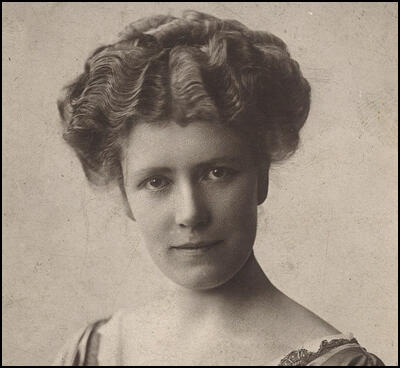
On this day in 1900 Claude Pepper, the son of sharecroppers, was born in Chambers County, Alabama, on 8th September, 1900. After leaving school he worked in a steel mill. After building up his savings he enrolled at the University of Alabama. When the United States entered the First World War in 1917 he joined the Student Army Training Corps, but with the war ending before he could see active service.
After graduating in 1921 Pepper attended Harvard Law School where he became friendly with Thomas Corcoran. He received his degree in 1924 and briefly taught law at the University of Arkansas. Pepper opened a law practice in Perry, Florida, where he opened a law practice. A member of the Democratic Party he was elected to the Florida House of Representatives in 1929. After his defeat he moved his law practice to Tallahassee.
Claude Pepper was a great supporter of President Franklin D. Roosevelt and the New Deal. He lost in the Democratic primary against Duncan Fletcher for the United States Senate in 1934. Fletcher died in June, 1936, and Pepper replaced him in the Senate. Pepper soon made it clear that he intended to promote policies to help the poor. This included support for Frances Perkins, Secretary of Labor, who had drawn up legislation to eliminate "labor conditions detrimental to the maintenance of the minimum standards of living necessary for health, efficiency and well-being of workers".
The Fair Labor Standards Act was passed in 1938. The act established maximum working hours of 44 a week for the first year, 42 for the second, and 40 thereafter. Minimum wages of 25 cents an hour were established for the first year, 30 cents for the second, and 40 cents over a period of the next six years. It also prohibited child labor in all industries engaged in producing goods in inter-state commerce. The act set the minimum age at 14 for employment outside of school hours in non-manufacturing jobs, at 16 for employment during school hours, and 18 for hazardous occupations.
As a result of Pepper's support of this legislation there were attempts, by J. Mark Wilcox to unseat him in the 1938 Democratic Party primary in Florida. As Jean Edward Smith, the author of FDR (2008) has pointed out: "Claude Pepper faced an uphill primary fight against Congressman J. Mark Wilcox of West Palm Beach, an ultra-conservative member of the Florida business establishment who made opposition to the wages and hours bill the centerpiece of his campaign. Wilcox was a marvel on the stump, and prognosticators gave Pepper little chance. In the colorful rhetoric of the Sunshine State, Wilcox titillated back country audiences with rumors that Pepper had been guilty of celibacy before marriage and addicted to monogamy ever since... Thomas Corcoran, a Harvard Law School classmate of Pepper, funneled funds from private donors into the campaign, and on May 3 Pepper won an upset victory, beating Wilcox by 65,000 votes." During the campaign he was quoted as saying: "If more politicians in this country were thinking about the next generation instead of the next election, it might be better for the United States and the world."
In May 1940 Claude Pepper helped William Allen White establish the Committee to Defend America by Aiding the Allies (CDAAA). White gave an interview to the Chicago Daily News where he argued: "Here is a life and death struggle for every principle we cherish in America: For freedom of speech, of religion, of the ballot and of every freedom that upholds the dignity of the human spirit... Here all the rights that common man has fought for during a thousand years are menaced... The time has come when we must throw into the scales the entire moral and economic weight of the United States on the side of the free peoples of Western Europe who are fighting the battle for a civilized way of life." It was not long before White's organization had 300 chapters nationwide. in May 1940. Other members included Clark M. Eichelberger (National Director), Adlai Stevenson, John J. Pershing and Philip Dunne. Members of the CDAAA argued that by advocating American military materiel support of Britain was the best way to keep the United States out of the war in Europe. The CDAAA disagreed strongly with the America First Committee, the main pressure group supporting complete neutrality and non-intervention in the war.
In 1940 Winston Churchill asked Franklin D. Roosevelt for help to beat Nazi Germany. At the time Britain was in a very difficult situation. In 1940 Germany had a population of 80 million with a workforce of 41 million. Britain had a population of 46 million with less than half Germany's workforce. Germany's total income at market prices was £7,260 million compared to Britain's £5,242 million. More ominously, the Germans had spent five times what Britain had spent on armaments - £1,710 million versus £358 million. Churchill was informed that Britain would soon run out of money to fight the war.
At first Roosevelt said he was unable to help because public opinion in the United States was completely opposed to becoming involved in the war. However, British intelligence had some important agents of the British Security Coordination (BSC) within the White House. This included Ernest Cuneo, Robert Sherwood and David Niles. Cuneo later recalled: "Given the time, the situation, and the mood, it is not surprising however, that BSC also went beyond the legal, the ethical, and the proper. Throughout the neutral Americas, and especially in the U.S., it ran espionage agents, tampered with the mails, tapped telephone, smuggled propaganda into the country, disrupted public gatherings, covertly subsidized newspapers, radios, and organizations, perpetrated forgeries - even palming one off on the President of the United States - violated the aliens registration act, shanghaied sailors numerous times, and possibly murdered one or more persons in this country."
Eventually Franklin D. Roosevelt was persuaded to change his mind. On 17th December, 1940, Roosevelt made a speech to the American public: "In the present world situation of course there is absolutely no doubt in the mind of a very overwhelming number of Americans that the best immediate defence of the United States is the success of Great Britain in defending itself; and that, therefore, quite aside from our historic and current interest in the survival of democracy in the world as a whole, it is equally important, from a selfish point of view of American defence, that we should do everything to help the British Empire to defend itself... In other words, if you lend certain munitions and get the munitions back at the end of the war, if they are intact - haven't been hurt - you are all right; if they have been damaged or have deteriorated or have been lost completely, it seems to me you come out pretty well if you have them replaced by the fellow to whom you have lent them."
Pepper was also a strong opponent of Adolf Hitler and urged United States intervention in the Second World War. At the request of Roosevelt he joined forces with Walter Lippmann, Charles Edward Marsh and Benjamin Cohen to help draft a plan to send military aid to Britain. Isolationists like Burton Wheeler of Montana, Arthur Vandenberg of Michigan and Thomas Connally of Texas argued that this legislation would lead to American involvement in the war. In early February 1941 a poll by the George H. Gallup organisation revealed that only 22 percent were unqualifiedly against the President's proposal. It has been argued by Thomas E. Mahl, the author of Desperate Deception: British Covert Operations in the United States, 1939-44 (1998), has argued that the Gallup organization had been infiltrated by the British Security Coordination (BSC).
On 11th March 1941, Congress passed the Lend-Lease Act. The legislation gave President Franklin D. Roosevelt the powers to sell, transfer, exchange, lend equipment to any country to help it defend itself against the Axis powers. A sum of $50 billion was appropriated by Congress for Lend-Lease. The money went to 38 different countries with Britain receiving over $31 billion.
Claude Pepper and his left-wing friend, George Norris, were strong supporters of Vice President Henry A. Wallace. However, more conservative elements in the party argued that he should be dropped as vice-president for the 1944 Presidential Election. A public opinion poll showed that Wallace was a popular figure and a survey to discover who Roosevelt's running-mate should be, suggested that he should be selected: The results were as follows: Wallace (46%), Cordell Hull (21%), James Farley (13%), Sam Rayburn (12%), James F. Byrnes (5%) and Harry F. Byrd (3%).
Walter Lippmann argued against Wallace being nominated as he considered him to be emotionally unsuited to be president: "We can't take the risk. This man may go crazy. we know that Roosevelt is not immortal." Robert Hannegan, the chairman of the Democratic National Committee, was totally opposed to Wallace and suggested that he should select Harry S. Truman instead. Roosevelt told Wallace he had a problem because some people were telling him that they thought he was "a Communist - or worse".
At the Democratic National Convention in 1944 Henry A. Wallace upset most of the party bosses by making a passionate defence of liberalism. "The future belongs to those who go down the line unswervingly for the liberal principles of both political democracy and economic democracy regardless of race, color or religion. In a political, educational and economic sense there must be no inferior races. The poll tax must go. Equal educational opportunities must come. The future must bring equal wages for equal work regardless of sex or race. Roosevelt stands for all this. That is why certain people hate him so. That also is one of the outstanding reasons why Roosevelt will be elected for a fourth time."
In McCook, Nebraska, a dying George Norris heard the speech and immediately sent him a letter: "I do not suppose it would be considered a proper speech for that occasion by the politicians. If you had been trying to appease somebody you made a mistake, but you were talking straight into the faces of your enemies who were trying to defeat you, and no matter what they may think or what effect it may have on them, the effect on the country and all those who will read that speech is that it was one of the most courageous exhibitions ever seen at a political convention in this country."
Claude Pepper organized a parade in favour of Wallace. Jennet Conant, the author of The Irregulars: Roald Dahl and the British Spy Ring in Wartime Washington (2008), has argued: "Senator Claude Pepper, who was with the Florida delegation, thought that Wallace parade had pulled it off. From what he could see, standing on his chair and looking down at the forest of state standards raised in the air, it appeared that 'if a vote was taken that evening, Wallace would be nominated'. The Wallace demonstrators looked like they were about to riot. Hannegan, realizing that emotions had become too hot, hastily yelled at the party chairman to adjourn the night session. Pepper tried to reach the platform, to appeal to the floor not to adjourn. With a bang of his gavel, it was over. The crowd groaned in protest, but the police were already ushering them toward the exists."
The speech put President Franklin D. Roosevelt in a difficult position and he now refused to come out openly for Wallace. The vote at the end of the first ballot was 429 to Wallace and 319 for Harry S. Truman. Conservatives in the party now decided to take action. Other candidates, Herbert O'Conor and John Hollis Bankhead, withdrew in favour of Truman. Robert Hannegan now approached others to change their vote. Hannegan later said, he would like his tombstone to be inscribed with the words: "Here lies the man who stopped Henry Wallace from becoming President of the United States." At the next ballot Truman won 1,031 votes against Wallace's 105. It later emerged that Bernard Baruch had offered Roosevelt a million dollars if he ran on a ticket without Wallace.
Pepper disagreed with administration's Cold War foreign policy and along with Henry A. Wallace helped to establish the Progressive Citizens of America (PCA). Other members included Rexford Tugwell, Paul Robeson, W.E.B. Du Bois, Arthur Miller, Dashiell Hammett, Hellen Keller, Thomas Mann, Aaron Copland, Eugene O'Neill, Glen H. Taylor, John Abt, Edna Ferber, Thornton Wilder, Carl Van Doren, Fredric March and Gene Kelly.
On 20th October, 1947, the Un-American Activities Committee opened its hearings concerning communist infiltration of the motion picture industry. Pepper joined forces with Harley Kilgore of West Virginia, Elbert D. Thomas of Utah, and Glenn H. Taylor of Idaho to protest about the hearings: "We the undersigned, as American Citizens who believe in constitutional democratic government, are disgusted and outraged by the continuing attempt of the House Committee on Un-American Activities to smear the Motion Picture Industry. We hold that these hearings are morally wrong because: (1) Any investigation into the political beliefs of the individual is contrary to the basic principles of our democracy; (2) Any attempt to curb freedom of expression and to set arbitrary standards of Americanism is in itself disloyal to both the spirit and the letter of the Constitution."
President Harry S. Truman had never forgiven Pepper for supporting Henry A. Wallace over him to become vice-president. He called George Smathers into a meeting at the White House and reportedly said "I want you to do me a favor. I want you to beat that son-of-a-bitch Claude Pepper." In 1950 Smathers took on Pepper in the primary election in Florida for the Senate. Smathers resorted to the tactics developed by Joseph McCarthy and claimed Pepper was a communist sympathizer because he supported civil rights and universal health care. Smathers called him "Red Pepper" and circulated a 49-page booklet titled The Red Record of Senator Claude Pepper . Pepper responded by calling Smathers a fear monger and bigot. However, Smathers won the election by 60,000 votes.
In 1962 Pepper was elected to the United States House of Representatives. He was now a staunch anti-communist and opposed Cuban leader Fidel Castro and supported aid to the Nicaraguan Contras. In 1977, he became chair of the new House Select Committee on Aging and became the nation's foremost spokesman for the elderly.
Claude Pepper died on 30th May, 1989.
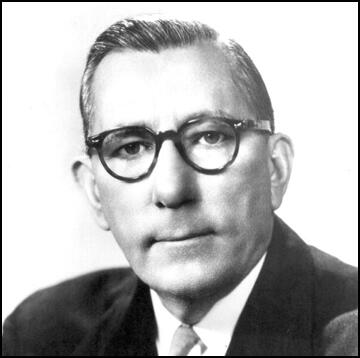
On this day in 1919 President Woodrow Wilson makes speech on the League of Nations.
For the first time in history the counsels of mankind are to be drawn together and concerted for the purpose of defending the rights and improving the conditions of working people - men, women, and children - all over the world. Such a thing as that was never dreamed of before, and what you are asked to discuss in discussing the League of Nations is the matter of seeing that this thing is not interfered with. There is no other way to do it than by a universal league of nations, and what is proposed is a universal league of nations.
Only two nations are for the time being left out. One of them is Germany, because we did not think that Germany was ready to come in, because we felt that she ought to go through a period of probation. She says that she made a mistake. We now want her to prove it by not trying it again. She says that she has abolished all the old forms of government by which little secret councils of men, sitting nobody knew exactly where, determined the fortunes of that
great nation and, incidentally, tried to determine the fortunes of mankind; but we want her to prove that her constitution is
changed and that it is going to stay changed; and then who can, after those proofs are produced, say "No" to a great
people, 60 million strong, if they want to come in on equal terms with the rest of us and do justice in international affairs?
I want to say that I did not find any of my colleagues in Paris disinclined to do justice to Germany. But I hear that this treaty is very hard on Germany. When an individual has committed a criminal act, the punishment is hard, but the punishment is not unjust. This nation permitted itself, through unscrupulous governors to commit a criminal act against mankind, and it is to undergo the punishment, not more than it can endure but up to the point where it can pay it must pay for the wrong that it has done.
But the things prescribed in this treaty will not be fully carried out if any one of the great influences that brought that result about is withheld from its consummation. Every great fighting nation in the world is on the list of those who are to constitute the League of Nations. I say every great nation, because America is going to be included among them, and the only choice my fellow citizens is whether we will go in now or come in later with Germany; whether we will go in as founders of this covenant of freedom or go in as those who are admitted after they have made a mistake and repented.
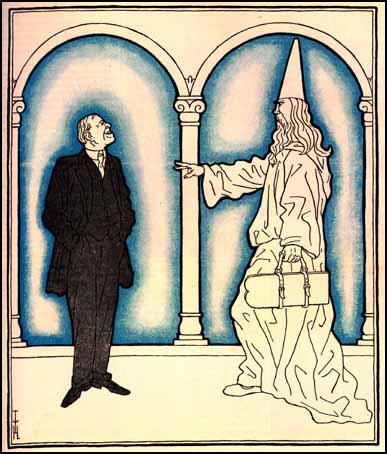
GOD: Woodrow Wilson, where are your 14 points?
WILSON: Don't get excited, Lord, we didn't keep your Ten Commandments either!
Thomas Heine, Simplicissimus, (17th June, 1919)
On this day in 1938 Vaughn Shoemaker produces the cartoon on Adolf Hitler and Czechoslovakia.
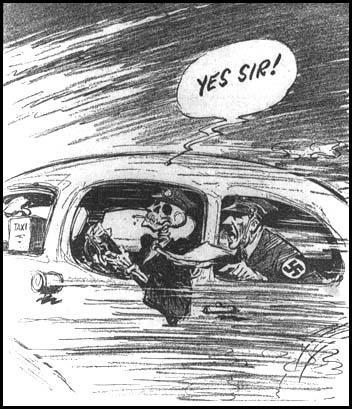
Chicago Times (8th September, 1938)
On this day in 1944 the first V2 Rocket lands on Britain. In the summer of 1942, Germany began working on two new secret weapon, the V-1 Flying Bomb, a pilotless monoplane that was powered by a pulse-jet motor and carried a one ton warhead. It was launched from a fixed ramp and travelled at about 350 mph and 4,000 feet and initially had a range of 150 miles (later 250 miles).
Germany fired 9,521 V-I bombs on southern England. Of these 4,621 were destroyed by anti-aircraft fire or by RAF fighters. An estimated 6,184 people were killed by these flying bombs. By August only 20 per cent of these bombs were reaching England.
The second secret weapon, the V-2 Rocket, was developed by Wernher von Braun, Walter Dornberger and Hermann Oberth at the rocket research station at Peenemunde.
The V-2 was first used in September, 1944. Like the V-1 Flying Bomb it carried a one ton warhead. However, this 14 metres (47 feet) long, liquid-fuelled rocket was capable of supersonic speed and could fly at an altitude of over 50 miles. As a result it could not be effectively stopped once launched.
Over 5,000 V-2s were fired on Britain. However, only 1,100 reached Britain. These rockets killed 2,724 people and badly injured 6,000. After the D-Day landings, Allied troops were on mainland Europe and they were able to capture the launch sites and by March, 1945, the attacks came to an end.
